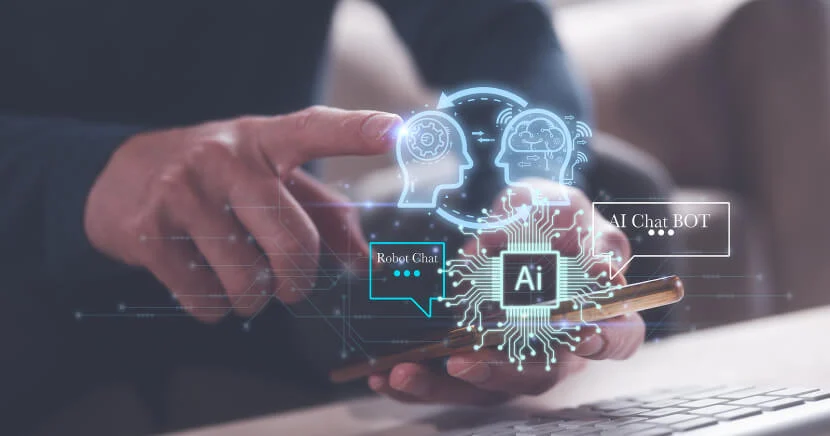How Student-Athletes Can Use AI to Improve Their Job Search and Career Development

The transition from student-athlete to full-time professional is a major step in any athlete’s career journey. While student-athletes have developed a unique set of skills—discipline, time management, and resilience—success in the workforce can often depend on their ability to adapt and utilize modern tools. One powerful tool that’s transforming the job search process is Artificial Intelligence (AI), which offers student-athletes a way to streamline their search, build their professional brand, and increase their chances of landing that dream job. Here’s how student-athletes can use AI to boost their job search and career development.
1. Automated Resume Builders
Crafting a polished resume can be a daunting task, especially for student-athletes who may not have traditional work experience to highlight. AI-powered resume builders, like Resume.io or Zety, can make this process faster and more effective. These tools use algorithms to create tailored resumes based on job descriptions, highlighting the most relevant skills, experiences, and achievements.
For student-athletes, this can mean leveraging their athletic career to its fullest potential—skills like leadership, teamwork, and resilience. AI can help present these skills in a format that appeals to hiring managers and recruiters. Additionally, AI-powered resume builders can suggest improvements or keyword optimizations to ensure the resume stands out in applicant tracking systems (ATS), increasing the likelihood of catching an employer’s eye.
2. Chatbots for Interview Prep and Job Matching
AI chatbots have become essential in job search and career development, especially for student-athletes who might need to practice interview questions or research job opportunities. Chatbots like Mya or Olivia use natural language processing (NLP) to simulate conversations with employers, allowing student-athletes to rehearse their responses and build confidence.
For example, a student-athlete might use an AI chatbot to simulate an interview for a sales role, where they can practice answering common questions or receive personalized feedback on their responses. These chatbots can also assist in job matching, helping student-athletes find positions that align with their skills and interests. By analyzing resumes, LinkedIn profiles, or preferences, chatbots can recommend job openings, making the search process more efficient and personalized.
3. Networking Automation with BluChip Scout
Networking is one of the most important components of a successful job search, but it can be difficult for student-athletes to dedicate time to build meaningful connections while balancing academics, sports, and job applications. This is where AI-driven tools like BluChip Scout come into play.
BluChip Scout automates networking outreach by sending personalized LinkedIn connection requests, profile views, and post interactions to hiring managers, recruiters, and industry professionals. This allows student-athletes to expand their professional network without spending hours on manual outreach. Additionally, BluChip Scout can help track responses, enabling student-athletes to follow up with connections and optimize their networking strategy.
By leveraging AI in this way, student-athletes can establish a strong online presence, build valuable professional relationships, and increase their chances of finding career opportunities in their field of interest.
4. Job Search and Application Automation
Job searching often involves scouring multiple job boards, filtering through countless opportunities, and applying to several positions. AI tools can help streamline this process by automatically applying to positions that match a student-athlete’s skills and interests.
AI-driven job search platforms like Jobscan or LinkedIn’s AI-powered job suggestions can filter positions based on criteria like location, salary, job type, and company size. For student-athletes, this means they can spend more time focusing on high-priority applications while the AI handles the heavy lifting. The system can even suggest optimizations to resumes and cover letters before submitting them, ensuring each application is tailored to the specific job.
5. Personalized Career Development with AI-Powered Coaching
Beyond job applications, AI can also provide personalized career coaching. Tools like CareerFoundry or AI-driven platforms like IBM Watson Career Coach offer student-athletes tailored advice on career progression, skill-building, and professional growth. These platforms analyze the student-athlete’s goals, qualifications, and market trends to suggest specific actions they can take to improve their career trajectory.
For instance, if a student-athlete is transitioning from sports to a business-related career, AI coaching tools can suggest relevant certifications, skills to develop, and networking events to attend, ensuring they stay on track and continue progressing toward their long-term goals.
6. Online Portfolio Creation and Management
A digital portfolio is becoming increasingly important for job seekers, especially in competitive industries like marketing, sales, and business. AI tools can assist in building and managing an online portfolio that highlights a student-athlete’s skills, achievements, and experiences.
Tools like Canva, Wix, and Behance use AI to help individuals design and manage their portfolios, ensuring that it looks professional and appealing to potential employers. For student-athletes, this can be a place to showcase their sports achievements, leadership roles, and any relevant work experience, all while helping them stand out from other job candidates.
7. Staying Updated with AI-Powered Career Insights
AI can also keep student-athletes informed about trends in the job market. Platforms like Glassdoor, Indeed, and LinkedIn use AI to offer job market insights, salary data, and employer reviews. For example, LinkedIn’s “Career Advice” feature offers personalized content and updates based on the student-athlete’s profile, keeping them informed of emerging opportunities in their field of interest.
In addition to helping student-athletes stay informed, these AI platforms can also provide recommendations on what skills are in demand in specific industries, so they can further refine their expertise and remain competitive in the workforce.
AI is transforming the job search and career development process for student-athletes, making it easier for them to leverage their unique skills, build a strong professional network, and access opportunities in a competitive job market. By utilizing AI tools to automate job applications, prepare for interviews, and develop personalized career strategies, student-athletes can navigate the transition from sports to professional work with confidence and success.
The future of job searching for student-athletes has never been more efficient or accessible, and by embracing these tools, they can unlock new pathways to career success.

